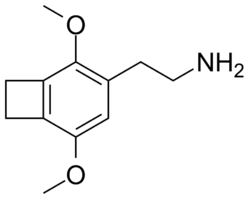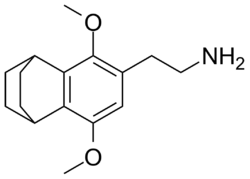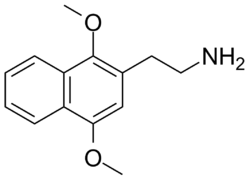Top Qs
Timeline
Chat
Perspective
2C-G
Pharmaceutical compound From Wikipedia, the free encyclopedia
Remove ads
2C-G, or 2C-G-0, also known as 3,4-dimethyl-2,5-dimethoxyphenethylamine or as 3-methyl-2C-D, is a psychedelic phenethylamine of the 2C family.[1] First synthesized by Alexander Shulgin, it has structural and pharmacodynamic properties similar to 2C-D and Ganesha (G).[1] The drug has a number of known homologues, which are known as the 2C-G series of compounds.[1]
Remove ads
Use and effects
In Alexander Shulgin's book PiHKAL (Phenethylamines I Have Known and Loved), the dose range is listed as 20 to 35 mg orally.[1] Effects are similar to the related Ganesha, and are extremely long lasting; the duration is 18 to 30 hours.[1] Visual effects are muted or absent, and it is described as an "insight-enhancer".[1] Unlike other members of the 2C series, 2C-G is nearly as potent as its amphetamine form.[1]
Remove ads
Interactions
Chemistry
Summarize
Perspective
Synthesis
The chemical synthesis of 2C-G has been described.[1]
Homologues
Several homologues of 2C-G (2C-G-0) were also synthesized and/or tested by Alexander Shulgin.[1] These include 2C-G-3, 2C-G-5, and 2C-G-N.[1] Some, such as 2C-G-1, 2C-G-2, 2C-G-4, and 2C-G-6, are possible to synthesize in principle but impossible or extraordinarily difficult to do so in practice.[1]
History
2C-G was first described in the literature by Alexander Shulgin in his 1991 book PiHKAL (Phenethylamines I Have Known and Loved).[1]
Society and culture
Legal status
Canada
As of October 31, 2016; 2C-G is a controlled substance (Schedule III) in Canada.[2]
United Kingdom
2C-G and all other compounds featuring in PiHKAL are Class A drugs in the United Kingdom.
United States
In the United States 2C-G is considered a Schedule I controlled substance as a positional isomer of 2C-E and DOM.[3]
See also
- 2C (psychedelics)
- Ganesha (G)
- DOTMA (Julia)
References
External links
Wikiwand - on
Seamless Wikipedia browsing. On steroids.
Remove ads









